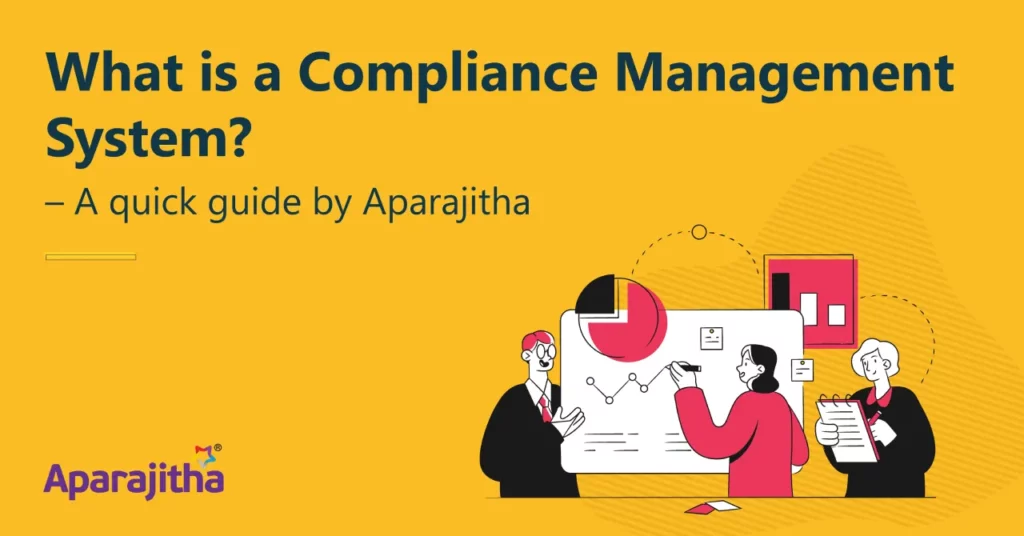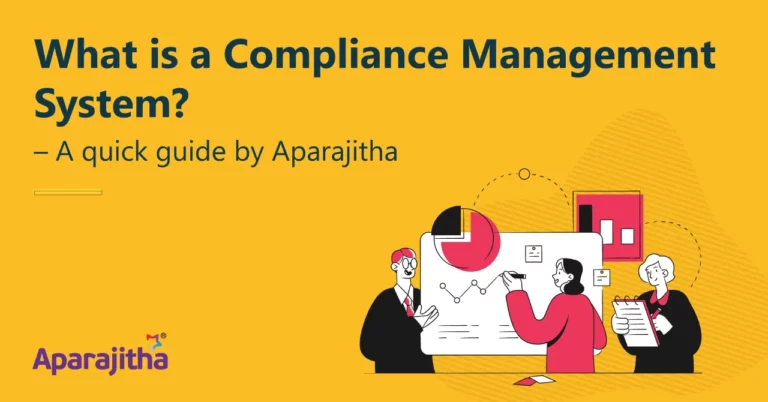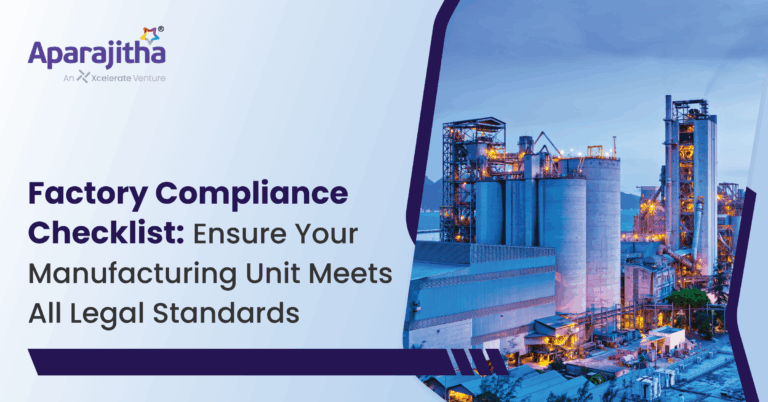What is Compliance and Why is it Important?
Compliance refers to the process of ensuring that an organization follows all government rules, laws, and legislations applicable to its operations. In today’s challenging business landscape, adhering to regulatory compliance is the first step for successful operations. However, the ever-changing regulations and the intricacies of ensuring compliance with all business laws make this process challenging. Failing to comply can result in reputational damage, penalties, and legal consequences. Having a meticulous compliance framework aka ‘Compliance Management System’ is crucial for organizations.
What is a Compliance Management System?
A Compliance Management System (CMS) refers to a comprehensive framework for organizations to manage, monitor, and ensure adherence to legal and regulatory requirements relevant to their industry.
In today’s complex business environment, maintaining regulatory compliance is essential for sustainable operations. However, the ongoing changes in regulations and the intricacies of ensuring compliance with all business laws make this task challenging.
The traditional methods of manual compliance tracking and management are increasingly proving inadequate. Organizations are realizing the inefficiencies and risks associated with paper-based or spreadsheet-dependent compliance practices. Herein lies the urgent need for modern CMS solutions that harness the power of automation and digitalization. These tools not only streamline compliance processes but also enhance accuracy, efficiency, and agility in response to regulatory changes.
By leveraging digitized cloud-based CMS platforms, organizations can centralize compliance efforts, automate routine tasks, and gain real-time insights into their compliance status. This proactive approach not only mitigates compliance risks but also empowers businesses to focus more on strategic initiatives and sustainable growth.
Failing to comply can result in hefty fines, damage to reputation, and legal consequences. Therefore, a strong Compliance Management System (CMS) is crucial for organizations.
This guide provides an in-depth look at Compliance Management Systems (CMS), detailing their advantages, essential features, and tips for selecting the best one for your business. Additionally, we will explore typical compliance challenges and how a digitized CMS can effectively address them.
Advantages of a Digitized Compliance Management System (CMS)
Integrating a CMS provides numerous benefits, such as:
- Risk Management: Utilizing a CMS enables the identification of compliance risks and the implementation of measures to mitigate them, thereby lowering the risk of facing legal and financial consequences.
- Cost Efficient: Investing in a robust CMS reduces overheads, frees up internal team bandwidth, and improves operational efficiency, safeguarding against fines and penalties through effective compliance management.
- Increased Operational Efficiency: By automating compliance procedures, organizations save valuable time and resources, enabling employees to concentrate on primary business functions.
- Enhanced Accountability: Implementing a CMS assigns roles and monitors compliance tasks, promoting a culture of responsibility throughout the organization.
- Improved Decision-Making: Utilizing a CMS provides organizations with reliable compliance data, enabling well-informed decision-making processes.
- Managing Reputation: Adhering to regulations consistently enhances the organization’s standing and fosters trust among stakeholders.
- Vendor Compliance: Regular audits for your contractors to ensure their compliances are up to date, reducing the exposure to penalties.
Key Features of a CMS
A robust CMS should include the following features:
- Knowledge Hub & Regulatory Monitoring: Maintain a continuously updated knowledge hub with all relevant compliance laws applicable to your business, ensuring stakeholders have access to current regulatory requirements.
- Automated Task Generation Based on applicable regulations : In addition to tracking changing laws, ensure that the CMS is updated with related compliance tasks and due dates. Automating this process will help timely and accurate actions. Additionally, managing internal processes through the CMS will further optimise workflows and mitigate risks.
- In-Built Checks (Maker/Checker Approver System): Implement a robust maker/checker approval system to enforce internal controls and verification processes, enhancing accuracy and reliability in compliance management.
- Real-time insights for decision-makers through dashboards, giving an overview of compliance health of the company.
- Risk Evaluation: Methods to identify, evaluate, and prioritize compliance risks.
- Compliance Reports : Get a 360 degree view of compliance through different reports, highlighting key aspects of compliances of the company and vendors
- Record-keeping: Archive of statutory documents for inspections and audits.
- Incident Handling: Processes for identifying, reporting, and resolving instances of non-compliance.
Choosing the Right CMS
Deciding on the best CMS for your organization entails several factors to consider:
- Evaluate Your Requirements: Determine your particular compliance needs based on your industry, company size, and regulatory landscape.
- Assess Features: Evaluate the functionalities of various Compliance Management solutions to verify they meet your requirements.
- Ease of Use & Cloud-Based: Choose a CMS that integrates seamlessly with your existing systems and is intuitive to use. Opt for a cloud-based solution for easy installation without the need for heavy infrastructure or hardware, offering adaptability to any environment.
- Vendor Credibility: Investigate the vendor’s standing, customer support quality, and industry track record.
- Financial Impact: Evaluate the overall expenses, encompassing setup, training, and continual upkeep, associated with ownership.
Frequent Compliance Hurdles and CMS Benefits
Organizations frequently encounter various compliance challenges, such as:
- Navigating Regulatory Changes: Remaining current with ever-changing laws and regulations can be challenging. A CMS equipped with regulatory monitoring capabilities aids organizations in maintaining compliance.
- Handling Compliance Data: Managing extensive compliance data manually can lead to errors. A CMS automates data handling to ensure precision and uniformity.
- Ensuring Employee Awareness: Employees may not always be aware of compliance requirements. A CMS provides industry updates, knowledge from experts and resources to keep them informed.
- Detecting Compliance Risks: Identifying compliance risks can be difficult without a structured approach. A CMS provides tools for risk assessment to preemptively pinpoint and address gaps.
- Archive of Statutory Documents: Thorough documentation is crucial for proving compliance to regulators. A CMS guarantees comprehensive and accessible documentation of all activities.
A Compliance Management System (CMS) is indispensable for organizations striving to uphold regulatory standards and mitigate risks effectively. By offering a structured approach to compliance management, a CMS boosts operational efficiency, promotes accountability, and protects the organization’s integrity. Choosing the ideal CMS entails assessing requirements, scrutinizing features, and ensuring scalability and reputable vendor support. Despite prevalent compliance obstacles, a robust CMS empowers organizations to confidently navigate regulatory complexities.
Take charge of compliance management with our Tech-Driven CMS solution, Simpliance Remo!
Gain access to a comprehensive knowledge platform covering:
✔ Fiscal, Corporate & Commercial Laws such as SEBI Act, Companies Act, MSMED Act, GST Act, etc.
✔ Environmental, Health & Safety Laws such as the Prevention & Control of Pollution Act, FSSAI Act Fire NOC, etc.
✔ Core Industry-Specific Laws
✔ Labour, Employment & Industrial Laws such as Labour Codes, PF, Gratuity, Factories Act, Mines Act, etc.
Advanced Features:
- Powered by Simpliance GRC platform, which includes modules for diverse compliance management
- Automated task and due dates updated based on amendments to the law
- Customizable Compliance Tasks: Tailor regulatory requirements to match your organization’s specific needs and internal policies.
- Real-time Monitoring: Stay informed with a live dashboard providing up-to-the-minute compliance status and risk assessments across your company.
- Collaborative Tools: Foster teamwork and streamline communication among stakeholders across departments for efficient compliance management.
- Document Management: Easily retrieve documents for reviews and audits, ensuring seamless compliance continuity.
- Automated Notifications: Receive timely email notifications for task tracking and compliance status updates.
Discover how Simpliance REMO – our Compliance Management Software can transform your compliance processes. Contact us today for a FREE demo and start your journey towards regulatory excellence.







